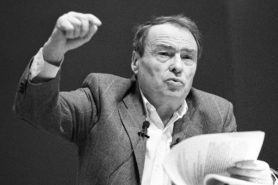Seminar Blogs
“Restructuring structuring structure” – Max Peters
Corporeal literacy was the main buzzword of Maaike Bleeker’s lecture, as she discusses how we can rethink the understanding of our bodies, bodily responses and body-mind relationship. The discourse she presents breaks with the dominant Cartesian school of thought, so effectively summarized by his cogito ergo sum adagio. We are not just simply our brains, to paraphrase Dutch neuroscientist Dick Swaab, there are more processes going on at once. Breaking away from many of these classic discourses seems to be a central starting point for corporeal literacy.

There is a classic, highly regarded scholar, however, whose work should not be broken with, mainly because of one of his central concepts. I am referring to anthropologist and sociologist Pierre Bourdieu and his concept of habitus. The habitus essentially relates to the structure of not just groups in society, but also individuals within these groups. It is a structured structure, a given network or pattern of social life, that precedes a structuring structure; ideologies spawning from conscious ideas that shape and form societal systems. Habitus is an all-encompassing, unavoidable and necessary collection of, mostly, subconscious, taken-for-granted modes of behavior, beliefs and relations to other people and groups. As Bourdieu lectures, “habitus are these generative and unifying principles which retranslate the intrinsic and relational characteristics of a position into a unitary life-style, that is, a unitary set of persons, goods, practices”. This unitary lifestyle beholds all that informs a person’s, as well as a group’s, positioning within the world. It closely relates to Antonio Gramsci’s doxa, which refers to what is beyond discussion, beyond questioning.
Habitus, as we learned from Maaike’s lecture, also goes beyond social relations and positions, because patterns of habitus relate to ideas of literacy. There is a tradition that presents thinking of literacy as disembodied, but as Maaike argued, in fact, literacy interacts directly with the minds and bodies of its users. In other words, we might be focusing on the wrong habitus of thinking when it comes to the reading body-mind relationships and bodily perceptions, and should go back to basic and rethink what comes before individual ideas and schools of thought, we need to jump to a higher level and really rethink our departure point. We need to restructure what we thought was our structuring structure, we need to inhabit a different understanding of the same, or maybe consider a new, habitus. Going back to Bourdieu, thus, inspires and pushes us to take a step back to our source of thinking, which is where inspiring concepts like corporeal literacy begin.
References
- Lecture by Maaike Bleeker for the Transmission in Motion program on April 25, 2018.
- Bourdieu, P. (1996). Physical space, social space and habitus. Vilhelm Aubert Memorial Lecture, Report, 10.
- Image source: https://sociologicamente.it/pierre-bourdieu-il-francese-che-conquisto-lamerica/

